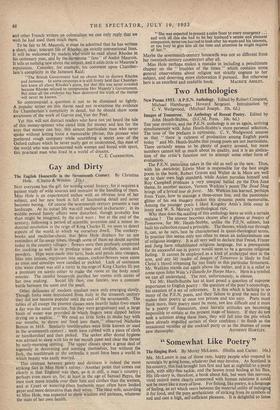Two Anthologies
New Poems 1953. A P.E.N. Anthology. Edited by Robert Conquest, Michael Hamburger, Howard Sergeant. Introduction by C. V. Wedgwood. (Michael Joseph. 10s. 6d.)
THE year revolves, and the P.E.N. anthology is on us again, arriving simultaneously with John Heath-Stubbs's more personal selection. The tone of the prefaces is optimistic. C. V. Wedgwood assures us that " there is richness of production among English poets today " and Mr. Heath-Stubbs that young poets are not inarticulate. There certainly seems to be plenty of poetry around, but mere numbers cannot tell us much about its quality, and it is an abdica- tion of the critic's function not to attempt some other form of evaluation.
The P.E.N. panorama takes in the old as well as the new. Thus, with his Antichrist, Edwin Muir is responsible for the best single poem in the book, Robert Graves and Walter de la Mare are well up to their own high standatd, while Auden parodies himself and Roy Campbell produces a very unequal ballad on the Don Juan theme. In another section, Vernon Watkins's poem The Dead Shag brings off a lyrical tour de force. Mr. Watkins has learned, perhaps from Yeats, how to manage a three-stress line, and the passionate glitter of his sea imagery makes this dynamic poem memorable. Among the younger poets I liked Kingsley Amis's little essay in irony and W. S. Merwin's mythological riot. Why then does the reading of this anthology leave us with a certain malaise ? The answer becomes clearer after a glance at Images of Tomorrow, for Mr. Heath-Stubbs, unlike the P.E.N. editors, has built his collection round a principle. The themes, which run through it, can, so he says, best be characterised in quasi-theological terms. In practice this seems only too often to mean an indiscriminate use of religious imagery. It is all very well to declare that Freud, Frazer and Jung have rehabilitated religious language, but a prerequisite for its successful use in poetry would seem to be a genuine religious feeling. It cannot be employed as a kind of archetypal shot in the arm, and any lay reader of Images of Tomorrow is likely to find Christ's blood streaming far too freely in this particular firmament. Mr. Watkins stands out again above the welter, and it is a relief to come upon John Wain's Villanelle for Harp° Marx. Here is a symbol we can all understand. The rest, unfortunately, is silence.
Yet Mr. Heath-Stubbs has at least posed a question of supreme importance to English Poetry : the question of the poet's cosmology, his creation of a set of references. It is this which is lacking in so many of the P.E.N. poets, and their failure to grasp the need for it - makes their poetry at once too private and too easy. Poets must think more, their poetry must be more, not less difficult and it must be a poetry of humanism, since hieratic attitudes are becoming impossible to sustain at the present stage of history. If they do not seek a solution along these lines, they will fall into the pits which have already engulfed certain of their confreres : to finish as the occasional versifier of the cocktail party or as the shaman of some


































 Previous page
Previous page